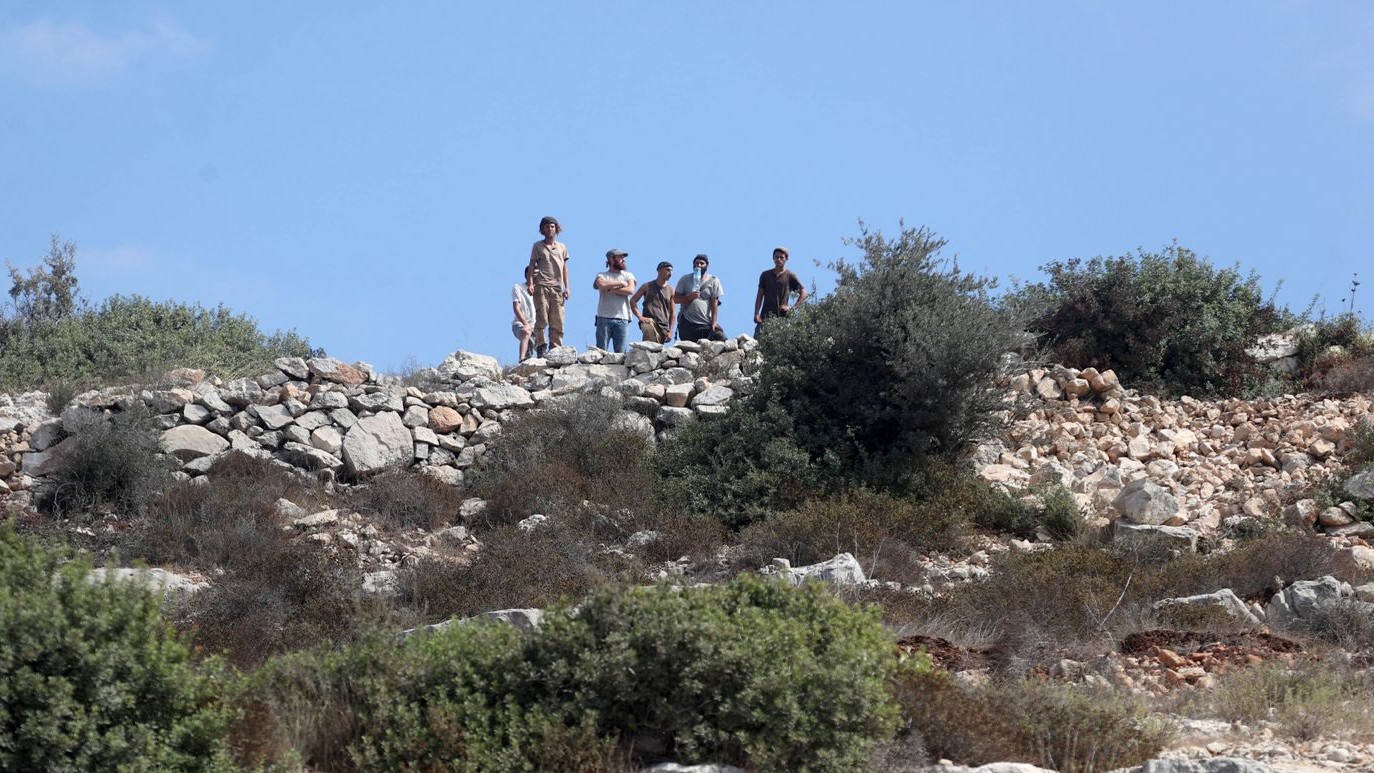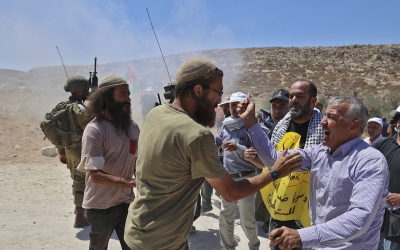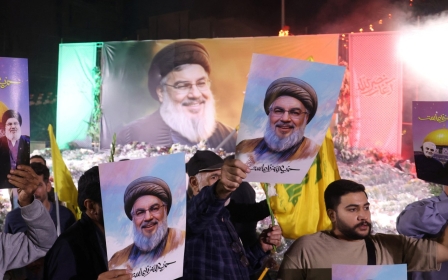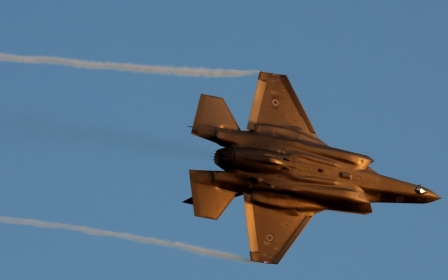Israeli settlers are seizing occupied West Bank land under the cover of war
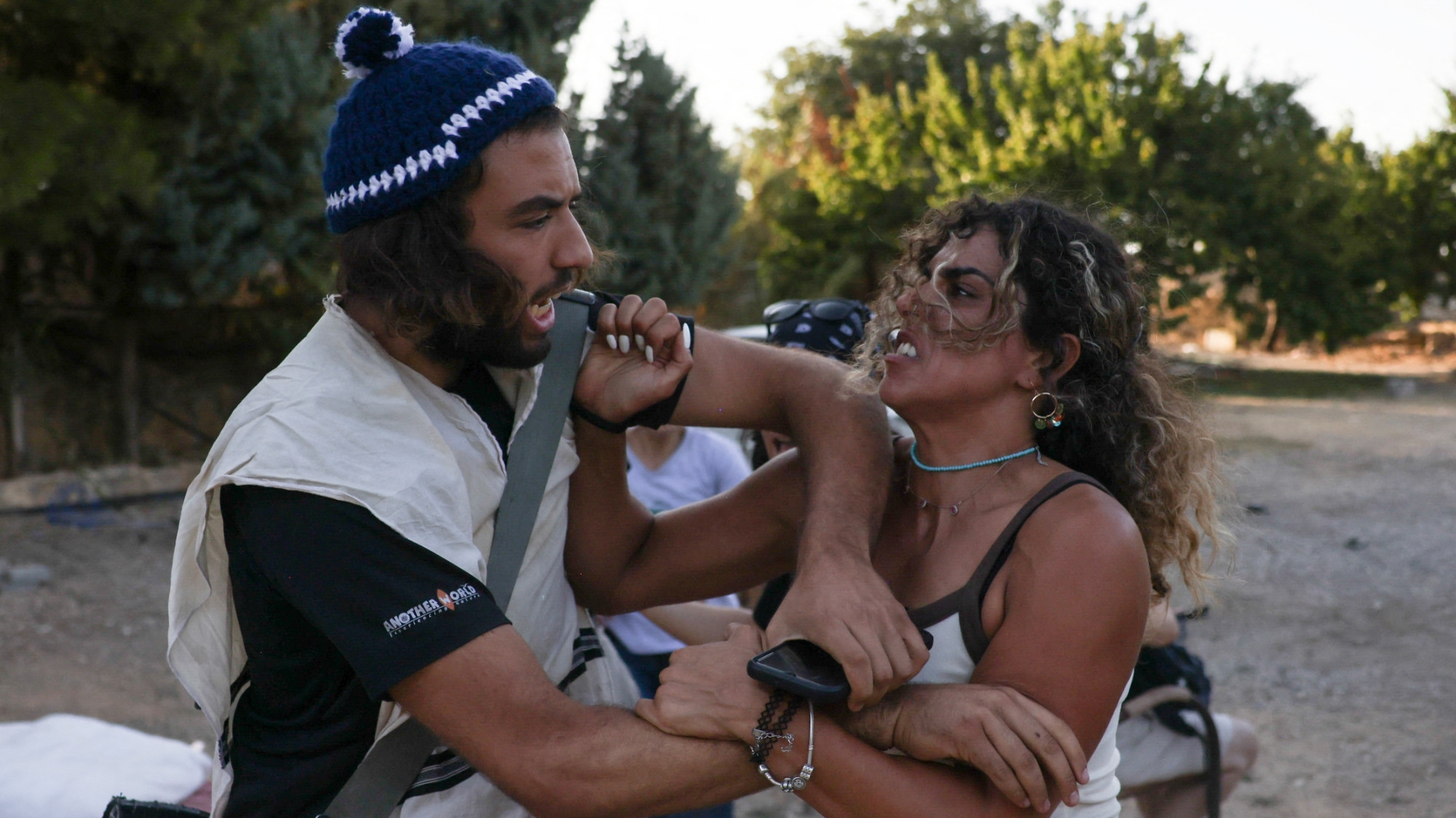
Hussein Khasib lives in constant fear, knowing he and his family could be next.
Over the past year, while much of the world's attention has been focused on the war on Gaza, several residents of Umm Safa - a picturesque village just 12km north of Ramallah - have been driven from their homes by armed settlers, often aided by the Israeli army.
Settler violence is not a new phenomenon in the occupied West Bank, where large swathes of territory are under Israeli civil and military control.
But since the war on Gaza erupted, land seizures and violent attacks aimed at forcing Palestinians to abandon their homes have spiked. The attacks have coincided with sweeping movement restrictions that have seen Palestinians denied access to cities, towns and villages.
In recent months, the settlers - emboldened by the election of far-right figures from the settlement movement - began levelling the al-Shami and Ras mountains near Umm Safa, with the aim of turning the area into a settlement outpost.
New MEE newsletter: Jerusalem Dispatch
Sign up to get the latest insights and analysis on Israel-Palestine, alongside Turkey Unpacked and other MEE newsletters
Residents told Middle East Eye that when they approached Israeli authorities for help, they were rebuffed and told to return with documents proving their legal ownership of the lands.
After an extensive search, they presented documents dating back hundreds of years to the Ottoman era, showing that they were, in fact, the legal owners.
"We went to the Israeli civil administration, hoping it would prevent the settlers from seizing our lands. In the end, they [the Israeli officials] told us that the lands were state property and we couldn't use them," Khasib told MEE.
In 1995, the Oslo Agreement divided the West Bank into three zones known as Areas A, B and C.
'The terrorism carried out by settler militias is why many Bedouin communities left'
- Hassan Malihat, al-Baidar Organization for the Defense of Bedouin Rights director
Area C, which comprises around 60 percent of the West Bank, was meant to be "gradually transferred to Palestinian jurisdiction". But after a failed peace process in which Israel refused to end its occupation and withdraw militarily, the area remains under full Israeli military and civil control.
Khasib told MEE that the lands currently being levelled were just 15m away from his home. Since the settlers started their construction works, he and his brothers received notices ordering them to demolish their homes.
"Every day, we live in hell," a distraught Khasib said.
"We don’t sleep at night because they aren't content with just bulldozing [the land] but also attacking our homes. They want us to leave so they can take over the entire mountain."
Taking advantage of war
According to the village council in Umm Safa, Israeli settlers have sought to connect the settlements of Halamish (Neve Tzuf) and Ateret, which were established after hundreds of Palestinians were evicted from their ancestral lands.
Around 600 dunams (60 hectares) of village land were also confiscated in the 1990s to build the main road leading to the settlements.
At present, there are only 720 Palestinians left in Umm Safa, many of whom lack the land to build new homes. Meanwhile, Israel has closed the village's eastern and western entrances, severely restricting civilian and commercial movement.
According to residents, human rights groups and experts, the situation in Umm Safa is not new and is part of a broader push by settlers and the Israeli government to take advantage of the war in Gaza to increase pressure on Palestinian communities to flee.
Earlier this year, Israeli authorities approved the seizure of 12.7 sqkm of land in the Jordan Valley, indicating it was the largest single appropriation approved since the 1993 Oslo Accords.
Many of the 700,000 Israelis who illegally live in occupied East Jerusalem and the West Bank are motivated by what they see as a religious mission to restore the historical land of Israel to the Jewish people.
According to Peace Now, an Israeli group advocating for a two-state solution and the end of Israel's occupation of Palestinian lands, the Israeli government "has allocated millions of dollars to protect small, unlicensed Jewish farms" in the West Bank and "secure small settlement outposts, with the aim of developing them until they become full-fledged settlements".
Documents revealed in July showed that the pro-settler Israeli government secretly funnelled money into unauthorised outposts, which are separate from the more than 100 officially recognised settlements.
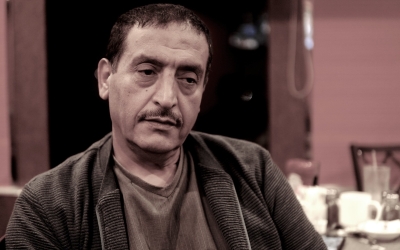
Some of those outposts have been linked to settler violence against Palestinians and are sanctioned by the US.
Last year, the Ministry of Settlements and National Missions, headed by Orit Strock, a far-right politician affiliated with the Jewish Home party, announced that 75 million shekels ($19.7 million) had been allocated in the budget to provide "security equipment for emerging settlements", a term used to refer to the unauthorised Jewish farms and settlement outposts in the West Bank.
The money that has been poured into settlement expansion has coincided with a sharp increase in violence by settlers against Palestinian men, women and children.
According to data from the Wall and Settlement Resistance Commission, during the first half of this year, settlers have carried out at least 1,334 attacks on Palestinians across the West Bank and killed at least seven Palestinians.
During the same period, settlers established at least 28 settlement outposts, including pastoral and agricultural ones, while the Israeli government conducted studies of 83 structural plans that included 13,730 settlement units, 8,511 of which were in the West Bank and 6,723 in Jerusalem.
The international community must intervene
The Jordan Valley in the east of the West Bank has emerged as one of the areas most susceptible to settlement expansion and settler violence, with human rights organisations recording almost daily attacks against Palestinians.
Hassan Malihat, the general supervisor of al-Baidar Organization for the Defense of Bedouin Rights, told MEE that Israel had emboldened settlers seeking to control the Jordan Valley by allowing them to establish pastoral settlements.
He said Bedouins were routinely targeted by settler gangs who would steal livestock, attack Palestinian children and launch attacks on homes and schools, including arson attacks.
"The terrorism carried out by settler militias is why many Bedouin communities forcibly left," he told MEE.
According to Malihat, at least 3,000 attacks had been carried out against Bedouin communities following the 7 October attacks on southern Israel, which led to at least 40 Bedouin communities fleeing their homes.
“The local population suffers from the absence of any legal protection, as the Israeli army supports the settlers in these attacks that are not individual or random.
"The responsibility is now on the international community to intervene and protect the rights of people so they can remain on their lands," he added.
For others, the emergence of pastoral settlements has emerged as a new tactic aimed at expelling Palestinians.
Jamal Juma, an expert on settlements and coordinator of the Stop the Wall campaign, told MEE that after Israel realised the effectiveness of establishing new settlements in the Jordan Valley and near Bedouin communities, new tactics were developed to upend life in Palestinian villages.
According to Juma, at least 115 pastoral outposts have been established since 2018. Many sprung up in the Jordan Valley area and then extended to more distant villages.
"These outposts completely isolate residents from their lands, so they don't dare to go there under the threat of attacks by heavily armed settlers and the Israeli army," he said.
The lands are easily controlled in this way without confiscation orders, military orders or Israeli court decisions, and they extend from the mountains of Ramallah all the way to the Jordan Valley.
"If we look at a map of Area C, it will be a cause of shock to the Palestinians," he said.
"There is a continuous depletion of Palestinian communities and they are being besieged with settlement outposts to force them to leave."
Middle East Eye delivers independent and unrivalled coverage and analysis of the Middle East, North Africa and beyond. To learn more about republishing this content and the associated fees, please fill out this form. More about MEE can be found here.


